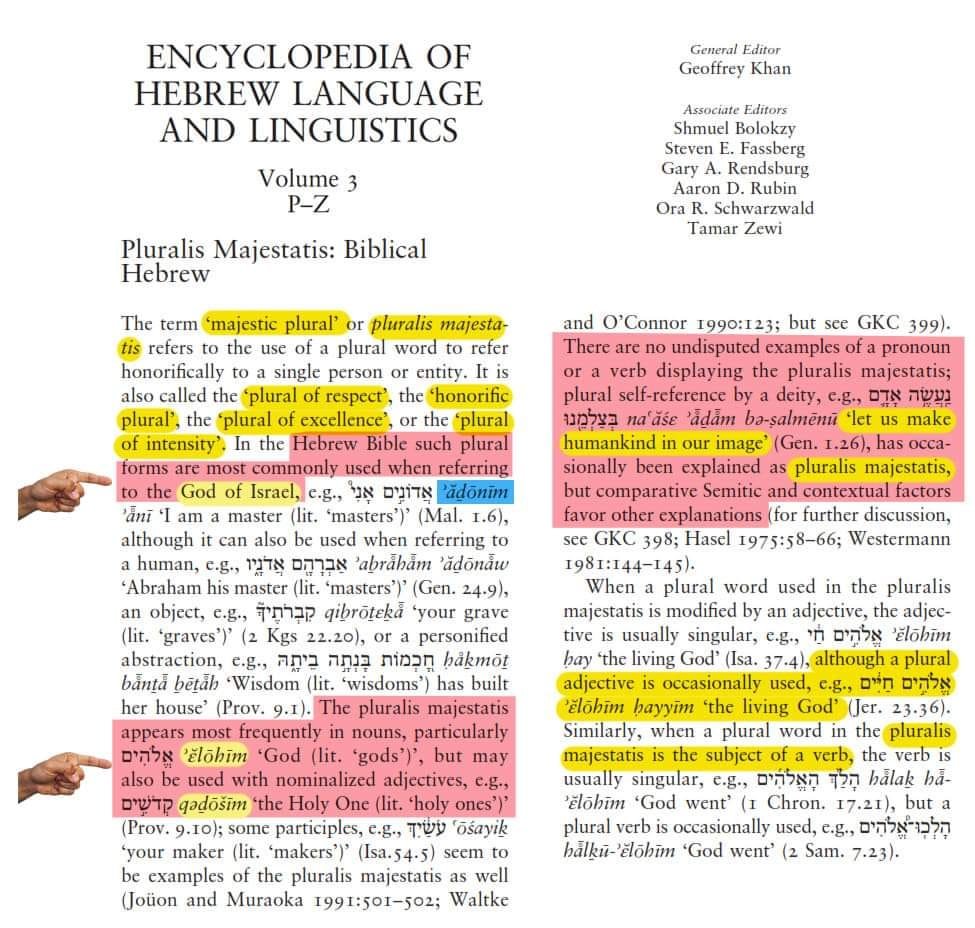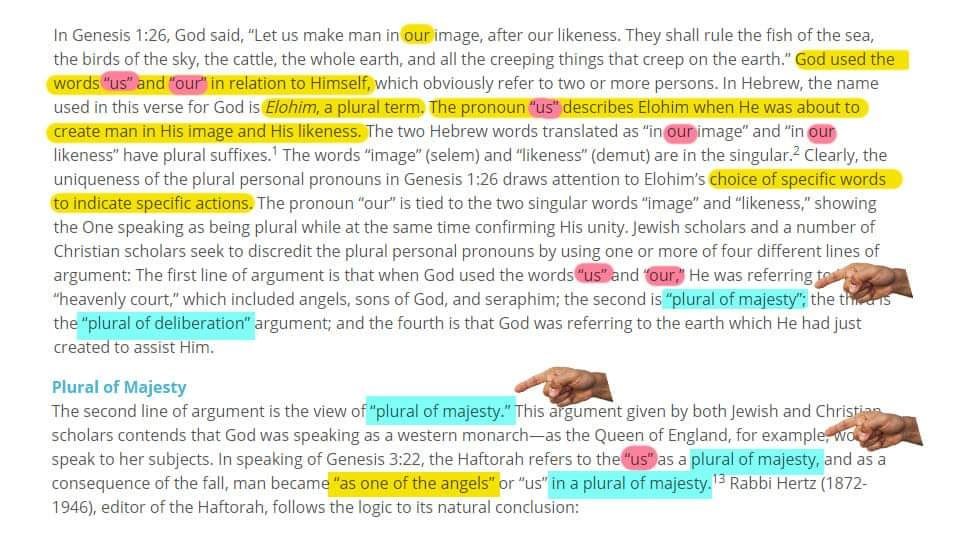𝐖𝐡𝐲 𝐐𝐮𝐫𝐚𝐧 𝐮𝐬𝐞𝐬 𝐦𝐚𝐬𝐜𝐮𝐥𝐢𝐧𝐞 𝐩𝐫𝐨𝐧𝐨𝐮𝐧𝐬 (𝐇𝐞/𝐇𝐢𝐦/𝐇𝐢𝐬) 𝐟𝐨𝐫 𝐀𝐥𝐥𝐚𝐡?
Mohamad Mostafa Nassar
Twitter:@NassarMohamadMR
𝐒𝐨𝐦𝐞 𝐩𝐞𝐨𝐩𝐥𝐞 𝐫𝐚𝐢𝐬𝐞 𝐭𝐡𝐞 𝐪𝐮𝐞𝐬𝐭𝐢𝐨𝐧 𝐚𝐬 𝐭𝐨 𝐰𝐡𝐲 𝐌𝐮𝐬𝐥𝐢𝐦𝐬 𝐫𝐞𝐟𝐞𝐫 𝐭𝐨 𝐀𝐥𝐥𝐚𝐡 𝐰𝐢𝐭𝐡 𝐦𝐚𝐬𝐜𝐮𝐥𝐢𝐧𝐞 𝐩𝐫𝐨𝐧𝐨𝐮𝐧𝐬 𝐰𝐡𝐞𝐧 𝐭𝐡𝐞𝐲 𝐬𝐚𝐲 𝐇𝐞 𝐡𝐚𝐬 𝐧𝐨 𝐠𝐞𝐧𝐝𝐞𝐫 𝐚𝐧𝐝 𝐢𝐬 𝐧𝐨𝐭 𝐥𝐢𝐤𝐞 𝐮𝐧𝐭𝐨 𝐚𝐧𝐲𝐨𝐧𝐞.
𝐈𝐧 𝐨𝐫𝐝𝐞𝐫 𝐭𝐨 𝐮𝐧𝐝𝐞𝐫𝐬𝐭𝐚𝐧𝐝 𝐭𝐡𝐞 𝐰𝐡𝐨𝐥𝐞 𝐢𝐝𝐞𝐚, 𝐩𝐥𝐞𝐚𝐬𝐞 𝐜𝐨𝐧𝐬𝐢𝐝𝐞𝐫 𝐭𝐡𝐞 𝐟𝐨𝐥𝐥𝐨𝐰𝐢𝐧𝐠 𝐩𝐨𝐢𝐧𝐭𝐬:
𝐍𝐚𝐭𝐮𝐫𝐚𝐥 𝐚𝐧𝐝 𝐆𝐫𝐚𝐦𝐦𝐚𝐭𝐢𝐜𝐚𝐥 𝐠𝐞𝐧𝐝𝐞𝐫𝐬:
𝐓𝐡𝐞𝐫𝐞 𝐚𝐫𝐞 𝐭𝐰𝐨 𝐤𝐢𝐧𝐝𝐬 𝐨𝐟 𝐠𝐞𝐧𝐝𝐞𝐫;
𝟏) 𝐍𝐚𝐭𝐮𝐫𝐚𝐥 (𝐇𝐚𝐪𝐞𝐞𝐪𝐢), 𝐫𝐞𝐥𝐚𝐭𝐞𝐝 𝐭𝐨 𝐨𝐧𝐞’𝐬 𝐛𝐢𝐨𝐥𝐨𝐠𝐢𝐜𝐚𝐥 𝐛𝐞𝐚𝐫𝐢𝐧𝐠 𝐚𝐧𝐝
𝟐) 𝐆𝐫𝐚𝐦𝐦𝐚𝐭𝐢𝐜𝐚𝐥 (𝐌𝐚𝐣𝐚𝐳𝐢) 𝐜𝐨𝐧𝐬𝐢𝐝𝐞𝐫𝐢𝐧𝐠 𝐭𝐡𝐞𝐢𝐫 𝐮𝐬𝐚𝐠𝐞 𝐢𝐧 𝐭𝐡𝐞 𝐥𝐚𝐧𝐠𝐮𝐚𝐠𝐞.
𝐓𝐡𝐞𝐬𝐞 𝐭𝐰𝐨 𝐤𝐢𝐧𝐝𝐬 𝐨𝐟 𝐠𝐞𝐧𝐝𝐞𝐫𝐬 𝐚𝐫𝐞 𝐟𝐨𝐮𝐧𝐝 𝐢𝐧 𝐦𝐚𝐧𝐲 𝐥𝐚𝐧𝐠𝐮𝐚𝐠𝐞𝐬 𝐛𝐮𝐭 𝐦𝐨𝐫𝐞 𝐞𝐬𝐩𝐞𝐜𝐢𝐚𝐥𝐥𝐲 𝐢𝐧 𝐀𝐫𝐚𝐛𝐢𝐜. 𝐈𝐛𝐧 𝐒𝐢𝐝𝐚 𝐢𝐧 𝐡𝐢𝐬 𝐜𝐥𝐚𝐬𝐬𝐢𝐜𝐚𝐥 𝐀𝐫𝐚𝐛𝐢𝐜 𝐠𝐫𝐚𝐦𝐦𝐚𝐫 𝐛𝐨𝐨𝐤 𝐪𝐮𝐨𝐭𝐞𝐬 𝐀𝐥-𝐅𝐚𝐫𝐢𝐬𝐢 𝐚𝐬 𝐬𝐚𝐲𝐢𝐧𝐠:
والتأنيثُ على وجهين تأنيثُ المعنى وتأنيثُ الاسمِ
‘𝐓𝐡𝐞𝐫𝐞 𝐚𝐫𝐞 𝐭𝐰𝐨 𝐤𝐢𝐧𝐝𝐬 𝐨𝐟 𝐟𝐞𝐦𝐢𝐧𝐢𝐧𝐢𝐭𝐲: 𝐟𝐞𝐦𝐢𝐧𝐢𝐧𝐢𝐭𝐲 𝐨𝐟 𝐦𝐞𝐚𝐧𝐢𝐧𝐠 𝐚𝐧𝐝 𝐟𝐞𝐦𝐢𝐧𝐢𝐧𝐢𝐭𝐲 𝐨𝐟 𝐰𝐨𝐫𝐝𝐢𝐧𝐠.’ (𝐀𝐥-𝐌𝐮𝐤𝐡𝐚𝐬𝐬𝐚𝐬 𝟒/𝟏𝟑𝟓)
𝐀𝐧𝐝 𝐨𝐛𝐯𝐢𝐨𝐮𝐬𝐥𝐲 𝐭𝐡𝐞 𝐬𝐚𝐦𝐞 𝐠𝐨𝐞𝐬 𝐟𝐨𝐫 𝐦𝐚𝐬𝐜𝐮𝐥𝐢𝐧𝐢𝐭𝐲.
𝐈𝐧 𝐀𝐫𝐚𝐛𝐢𝐜 𝐒𝐮𝐧 𝐢𝐬 𝐟𝐞𝐦𝐢𝐧𝐢𝐧𝐞 𝐚𝐧𝐝 𝐌𝐨𝐨𝐧 𝐢𝐬 𝐦𝐚𝐬𝐜𝐮𝐥𝐢𝐧𝐞, 𝐬𝐮𝐫𝐞𝐥𝐲 𝐭𝐡𝐞𝐲 𝐡𝐚𝐯𝐞 𝐧𝐨 𝐠𝐞𝐧𝐝𝐞𝐫 𝐛𝐮𝐭 𝐭𝐡𝐚𝐭’𝐬 𝐰𝐡𝐚𝐭 𝐭𝐡𝐞𝐢𝐫 𝐞𝐭𝐲𝐦𝐨𝐥𝐨𝐠𝐢𝐜𝐚𝐥 𝐟𝐨𝐫𝐦 𝐦𝐚𝐤𝐞𝐬 𝐨𝐟 𝐭𝐡𝐞𝐦.
𝐄𝐯𝐞𝐧 𝐢𝐧 𝐄𝐧𝐠𝐥𝐢𝐬𝐡 𝐬𝐭𝐚𝐭𝐞𝐬 𝐚𝐧𝐝 𝐬𝐡𝐢𝐩𝐬 𝐚𝐫𝐞 𝐫𝐞𝐟𝐞𝐫𝐫𝐞𝐝 𝐭𝐨 𝐰𝐢𝐭𝐡 𝐟𝐞𝐦𝐢𝐧𝐢𝐧𝐞 𝐩𝐫𝐨𝐧𝐨𝐮𝐧𝐬. 𝐓𝐡𝐢𝐬 𝐟𝐚𝐜𝐭 𝐝𝐨𝐞𝐬 𝐧𝐨𝐭 𝐚𝐬𝐬𝐢𝐠𝐧 𝐭𝐡𝐞𝐦 𝐚 𝐝𝐞 𝐟𝐚𝐜𝐭𝐨 𝐠𝐞𝐧𝐝𝐞𝐫 𝐚𝐬 𝐢𝐧 𝐡𝐮𝐦𝐚𝐧𝐬 𝐚𝐧𝐝 𝐚𝐧𝐢𝐦𝐚𝐥𝐬.
𝐀𝐫𝐚𝐛𝐢𝐜 𝐡𝐚𝐬 𝐧𝐨 𝐧𝐞𝐮𝐭𝐫𝐚𝐥 𝐠𝐞𝐧𝐝𝐞𝐫:
𝐀𝐧 𝐢𝐦𝐩𝐨𝐫𝐭𝐚𝐧𝐭 𝐩𝐨𝐢𝐧𝐭 𝐰𝐞 𝐧𝐞𝐞𝐝 𝐭𝐨 𝐤𝐞𝐞𝐩 𝐢𝐧 𝐦𝐲 𝐦𝐢𝐧𝐝 𝐢𝐬 𝐭𝐡𝐚𝐭 𝐀𝐫𝐚𝐛𝐢𝐜 𝐡𝐚𝐬 𝐧𝐨 𝐧𝐞𝐮𝐭𝐫𝐚𝐥 𝐠𝐞𝐧𝐝𝐞𝐫 𝐬𝐨 𝐭𝐡𝐞𝐫𝐞 𝐢𝐬 𝐧𝐨𝐭𝐡𝐢𝐧𝐠 𝐥𝐢𝐤𝐞 ‘𝐢𝐭’ 𝐢𝐧 𝐀𝐫𝐚𝐛𝐢𝐜. 𝐄𝐯𝐞𝐫𝐲𝐭𝐡𝐢𝐧𝐠 𝐢𝐬 𝐫𝐞𝐟𝐞𝐫𝐫𝐞𝐝 𝐭𝐨 𝐮𝐬𝐢𝐧𝐠 𝐞𝐢𝐭𝐡𝐞𝐫 𝐦𝐚𝐬𝐜𝐮𝐥𝐢𝐧𝐞 𝐨𝐫 𝐟𝐞𝐦𝐢𝐧𝐢𝐧𝐞 𝐩𝐫𝐨𝐧𝐨𝐮𝐧𝐬.
‘𝐀𝐥𝐥𝐚𝐡’ (الله) 𝐜𝐚𝐧𝐧𝐨𝐭 𝐛𝐞 𝐟𝐞𝐦𝐢𝐧𝐢𝐧𝐞 𝐚𝐜𝐜𝐨𝐫𝐝𝐢𝐧𝐠 𝐭𝐨 𝐭𝐡𝐞 𝐫𝐮𝐥𝐞𝐬 𝐨𝐟 𝐀𝐫𝐚𝐛𝐢𝐜:
𝐈𝐧 𝐟𝐚𝐜𝐭 𝐭𝐡𝐞 𝐦𝐚𝐤𝐞𝐮𝐩 𝐨𝐟 𝐭𝐡𝐞 𝐰𝐨𝐫𝐝 الله (𝐀𝐥𝐥𝐚𝐡) 𝐢𝐬 𝐬𝐮𝐜𝐡 𝐭𝐡𝐚𝐭 𝐢𝐭 𝐜𝐚𝐧𝐧𝐨𝐭 𝐛𝐞 𝐟𝐞𝐦𝐢𝐧𝐢𝐧𝐞 𝐟𝐨𝐫;
𝟏- 𝐀 𝐰𝐨𝐫𝐝 𝐢𝐬 𝐟𝐞𝐦𝐢𝐧𝐢𝐧𝐞 𝐢𝐧 𝐀𝐫𝐚𝐛𝐢𝐜 𝐢𝐟 𝐢𝐭 𝐢𝐬 𝐬𝐨 𝐛𝐲 𝐧𝐚𝐭𝐮𝐫𝐞 𝐥𝐢𝐤𝐞 أم 𝐢.𝐞. 𝐮𝐦𝐦 𝐛𝐮𝐭 𝐨𝐛𝐯𝐢𝐨𝐮𝐬𝐥𝐲 𝐀𝐥𝐥𝐚𝐡 𝐢𝐬 𝐧𝐨𝐭 𝐟𝐞𝐦𝐢𝐧𝐢𝐧𝐞 𝐛𝐲 𝐧𝐚𝐭𝐮𝐫𝐞.
𝟐- 𝐀 𝐰𝐨𝐫𝐝 𝐢𝐬 𝐟𝐞𝐦𝐢𝐧𝐢𝐧𝐞 𝐢𝐟 𝐢𝐭 𝐞𝐧𝐝𝐬 𝐰𝐢𝐭𝐡 𝐭𝐡𝐞 𝐭𝐡𝐢𝐫𝐝 𝐨𝐟 𝐭𝐡𝐞 𝐀𝐫𝐚𝐛𝐢𝐜 𝐚𝐥𝐩𝐡𝐚𝐛𝐞𝐭 𝐢.𝐞. 𝐭𝐚𝐚 𝐥𝐢𝐤𝐞 مروحة (𝐟𝐚𝐧). 𝐓𝐡𝐢𝐬 𝐢𝐬 𝐧𝐨𝐭 𝐭𝐡𝐞 𝐜𝐚𝐬𝐞 𝐰𝐢𝐭𝐡 𝐭𝐡𝐞 𝐰𝐨𝐫𝐝 الله (𝐀𝐥𝐥𝐚𝐡).
𝟑- 𝐀 𝐰𝐨𝐫𝐝 𝐢𝐬 𝐟𝐞𝐦𝐢𝐧𝐢𝐧𝐞 𝐢𝐟 𝐢𝐭 𝐞𝐧𝐝𝐬 𝐰𝐢𝐭𝐡 آ 𝐢.𝐞. 𝐀𝐥𝐢𝐟 𝐌𝐚𝐦𝐝𝐮𝐝𝐚 𝐚𝐧𝐝 𝐢𝐧𝐝𝐞𝐞𝐝 𝐭𝐡𝐢𝐬 𝐚𝐥𝐬𝐨 𝐢𝐬 𝐧𝐨𝐭 𝐭𝐡𝐞 𝐜𝐚𝐬𝐞 𝐰𝐢𝐭𝐡 𝐭𝐡𝐞 𝐰𝐨𝐫𝐝 الله (𝐀𝐥𝐥𝐚𝐡).
𝟒- 𝐒𝐨𝐦𝐞𝐭𝐡𝐢𝐧𝐠 𝐜𝐚𝐧 𝐛𝐞 𝐟𝐞𝐦𝐢𝐧𝐢𝐧𝐞 𝐢𝐟 𝐢𝐭 𝐡𝐚𝐩𝐩𝐞𝐧𝐬 𝐭𝐨 𝐛𝐞 𝐢𝐧 𝐩𝐚𝐢𝐫𝐬 𝐥𝐢𝐤𝐞 عينين (𝐞𝐲𝐞𝐬) 𝐨𝐫 يدين (𝐡𝐚𝐧𝐝𝐬). 𝐂𝐞𝐫𝐭𝐚𝐢𝐧𝐥𝐲, 𝐭𝐡𝐢𝐬 𝐢𝐬 𝐧𝐨𝐭 𝐭𝐡𝐞 𝐜𝐚𝐬𝐞 𝐰𝐢𝐭𝐡 𝐭𝐡𝐞 𝐰𝐨𝐫𝐝 الله (𝐀𝐥𝐥𝐚𝐡).
𝐓𝐡𝐞𝐬𝐞 𝐩𝐨𝐢𝐧𝐭𝐬 𝐜𝐥𝐚𝐫𝐢𝐟𝐲 𝐭𝐡𝐚𝐭 𝐭𝐡𝐞 𝐦𝐚𝐤𝐞𝐮𝐩 𝐨𝐟 𝐭𝐡𝐞 𝐰𝐨𝐫𝐝 𝐀𝐥𝐥𝐚𝐡 𝐝𝐨𝐞𝐬 𝐧𝐨𝐭 𝐚𝐥𝐥𝐨𝐰 𝐮𝐬 𝐭𝐨 𝐫𝐞𝐟𝐞𝐫 𝐭𝐨 𝐢𝐭 𝐰𝐢𝐭𝐡 𝐟𝐞𝐦𝐢𝐧𝐢𝐧𝐞 𝐩𝐫𝐨𝐧𝐨𝐮𝐧𝐬.
𝐋𝐞𝐭 𝐮𝐬 𝐰𝐚𝐭𝐜𝐡 𝐭𝐡𝐢𝐬 𝐯𝐢𝐝𝐞𝐨: 𝐖𝐡𝐲 𝐢𝐬 𝐀𝐥𝐥𝐚𝐡 𝐚𝐥𝐰𝐚𝐲𝐬 𝐫𝐞𝐟𝐞𝐫𝐫𝐞𝐝 𝐭𝐨 𝐚𝐬 ‘𝐇𝐞/ هو’ 𝐚𝐧𝐝 𝐍𝐨𝐭 ‘𝐬𝐡𝐞/ هي’ | 𝐀𝐫𝐚𝐛𝐢𝐜𝟏𝟎𝟏
𝐌𝐚𝐬𝐜𝐮𝐥𝐢𝐧𝐢𝐭𝐲 𝐠𝐞𝐧𝐞𝐫𝐚𝐥𝐥𝐲 𝐝𝐞𝐧𝐨𝐭𝐞𝐬 𝐌𝐚𝐣𝐞𝐬𝐭𝐲:
𝐈𝐟 𝐨𝐧𝐞 𝐚𝐬𝐤𝐬 𝐰𝐡𝐲 𝐭𝐨 𝐮𝐬𝐞 𝐭𝐡𝐞 𝐦𝐚𝐬𝐜𝐮𝐥𝐢𝐧𝐞 𝐩𝐫𝐨𝐧𝐨𝐮𝐧 𝐟𝐨𝐫 𝐀𝐥𝐥𝐚𝐡 𝐚𝐧𝐝 𝐧𝐨𝐭 𝐟𝐞𝐦𝐢𝐧𝐢𝐧𝐞 𝐭𝐡𝐞𝐧 𝐭𝐡𝐞 𝐚𝐧𝐬𝐰𝐞𝐫 𝐢𝐬 𝐭𝐡𝐚𝐭 𝐠𝐞𝐧𝐞𝐫𝐚𝐥𝐥𝐲, 𝐦𝐚𝐬𝐜𝐮𝐥𝐢𝐧𝐢𝐭𝐲 𝐫𝐞𝐩𝐫𝐞𝐬𝐞𝐧𝐭𝐬 𝐌𝐚𝐣𝐞𝐬𝐭𝐲 𝐚𝐧𝐝 𝐟𝐞𝐦𝐢𝐧𝐢𝐧𝐢𝐭𝐲 𝐝𝐞𝐧𝐨𝐭𝐞𝐬 𝐦𝐞𝐞𝐤𝐧𝐞𝐬𝐬 𝐚𝐧𝐝 𝐬𝐨𝐟𝐭𝐧𝐞𝐬𝐬. 𝐀𝐧𝐝 𝐚𝐬 𝐭𝐡𝐞 𝐩𝐫𝐢𝐦𝐚𝐫𝐲 𝐫𝐞𝐥𝐚𝐭𝐢𝐨𝐧 𝐨𝐟 𝐦𝐚𝐧 𝐰𝐢𝐭𝐡 𝐀𝐥𝐥𝐚𝐡 𝐢𝐬 𝐭𝐡𝐚𝐭 𝐨𝐟 𝐚 𝐡𝐮𝐦𝐛𝐥𝐞 𝐬𝐞𝐫𝐯𝐚𝐧𝐭 𝐭𝐨 𝐡𝐢𝐬 𝐥𝐨𝐫𝐝 𝐬𝐨 𝐭𝐡𝐞 𝐦𝐚𝐬𝐜𝐮𝐥𝐢𝐧𝐞 𝐩𝐫𝐨𝐧𝐨𝐮𝐧𝐬 𝐬𝐮𝐢𝐭 𝐦𝐨𝐫𝐞 𝐭𝐡𝐞 𝐃𝐢𝐯𝐢𝐧𝐞 𝐌𝐚𝐣𝐞𝐬𝐭𝐲.
𝐋𝐚𝐬𝐭 𝐰𝐨𝐫𝐝:
𝐌𝐚𝐬𝐜𝐮𝐥𝐢𝐧𝐞 𝐩𝐫𝐨𝐧𝐨𝐮𝐧𝐬 𝐮𝐬𝐞𝐝 𝐟𝐨𝐫 𝐀𝐥𝐥𝐚𝐡 𝐝𝐨 𝐧𝐨𝐭 𝐠𝐢𝐯𝐞 𝐚𝐧𝐲 𝐚𝐧𝐭𝐡𝐫𝐨𝐩𝐨𝐦𝐨𝐫𝐩𝐡𝐢𝐜 𝐬𝐞𝐧𝐬𝐞 𝐛𝐞𝐜𝐚𝐮𝐬𝐞 𝐢𝐭 𝐢𝐬 𝐧𝐨𝐫𝐦𝐚𝐥 𝐚𝐭 𝐥𝐞𝐚𝐬𝐭 𝐜𝐨𝐧𝐬𝐢𝐝𝐞𝐫𝐢𝐧𝐠 𝐭𝐡𝐞 𝐀𝐫𝐚𝐛𝐢𝐜 𝐥𝐚𝐧𝐠𝐮𝐚𝐠𝐞 𝐜𝐨𝐧𝐯𝐞𝐧𝐭𝐢𝐨𝐧. 𝐀𝐧𝐝 𝐢𝐭, 𝐰𝐞 𝐦𝐚𝐲 𝐬𝐚𝐲, 𝐝𝐞𝐧𝐨𝐭𝐞𝐬 𝐭𝐡𝐞 𝐃𝐢𝐯𝐢𝐧𝐞 𝐌𝐚𝐣𝐞𝐬𝐭𝐲.
𝐈𝐍𝐃𝐄𝐄𝐃 𝐀𝐋𝐋𝐀𝐇 𝐊𝐍𝐎𝐖𝐒 𝐓𝐇𝐄 𝐁𝐄𝐒𝐓!

𝐈𝐧 𝐜𝐚𝐬𝐞 𝐭𝐡𝐞 𝐂𝐡𝐫𝐢𝐬𝐭𝐢𝐚𝐧𝐬 𝐚𝐭𝐭𝐚𝐜𝐤 𝐈𝐬𝐥𝐚𝐦 𝐚𝐛𝐨𝐮𝐭 𝐭𝐡𝐞 “𝐑𝐨𝐲𝐚𝐥 𝐖𝐞” (𝐖𝐞, 𝐔𝐬, 𝐎𝐮𝐫) 𝐢𝐧 𝐓𝐡𝐞 𝐆𝐥𝐨𝐫𝐢𝐨𝐮𝐬 𝐇𝐨𝐥𝐲 𝐐𝐮𝐫𝐚𝐧. 𝐑𝐨𝐲𝐚𝐥 𝐖𝐞 (𝐌𝐚𝐣𝐞𝐬𝐭𝐢𝐜 𝐏𝐥𝐮𝐫𝐚𝐥) 𝐚𝐥𝐬𝐨 𝐞𝐱𝐢𝐬𝐭 𝐢𝐧 𝐭𝐡𝐞𝐢𝐫 𝐁𝐢𝐛𝐥𝐞.




𝐀𝐥𝐥𝐚𝐡 𝐊𝐧𝐨𝐰𝐬 𝐁𝐞𝐬𝐭.
𝐑𝐞𝐟𝐞𝐫𝐞𝐧𝐜𝐞𝐬:
Why Do We Refer to God Using the Masculine Pronoun?
The use of the plural “We” by God in the Quran- The Majestic We
God using the plural for Himself
The Concept of “We” as used in The Qur’an by Allah
…𝐛𝐲 𝐖𝐚𝐪𝐚𝐫 𝐀𝐤𝐛𝐚𝐫 𝐂𝐡𝐞𝐞𝐦𝐚